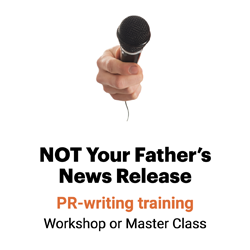The media’s not shopping for a commercial
Journalists aren’t looking for commercials. They’re seeking stories. So pitch a story, not a product.

That means focusing your pitch on a benefit to the media’s audience, timely news or entertaining information.
Here are some tips for writing pitches instead of commercials:
1. Enter the conversation people are already having.
Insert your organization into a broader trend, what’s happening in society today.
Look for the “word of the day,” suggest Jeff Crilley, founder or Real News PR and author of Free Publicity. Right now, it’s the economy. After Katrina, it was hurricanes. After 9/11, it was terrorism.
That’s the story journalists are covering. How can you make your organization part of that story?
2. Don’t brand your story.
Skip the trademark symbols and multiple capitalized product and company names. They’re not necessary in an informal emailed pitch, and they scream “commercial,” says Michael Schiferl, senior vice president/director of Media Relations for Weber Shandwick Worldwide.
And leave your company name out of the headline. Newspapers rarely put company or product names in headlines. To do so on your pitch “shouts to the journalist that this is a commercial for blank,” Crilley says.
3. Find a poster child.
Instead of writing about your product, service or issue, write about someone who’s affected by it.
4. Focus on what your spokesperson will say.
Instead of running a lengthy bio, pre-interview your subject matter expert. Does she have a contrarian opinion or offer a fresh point of view? That — and not a list of which boards she sits on — is the story.
Pitch a story.
Want to sell a story? Pitch a story — not a product.
______
Source: “Perfect Email Pitches: Master PR Scribes Reveal How to Craft Copy That Turns Heads and Earns Media Ink,” Bulldog Reporter’s PR University teleseminar, Sept. 18, 2008

Leave a Reply